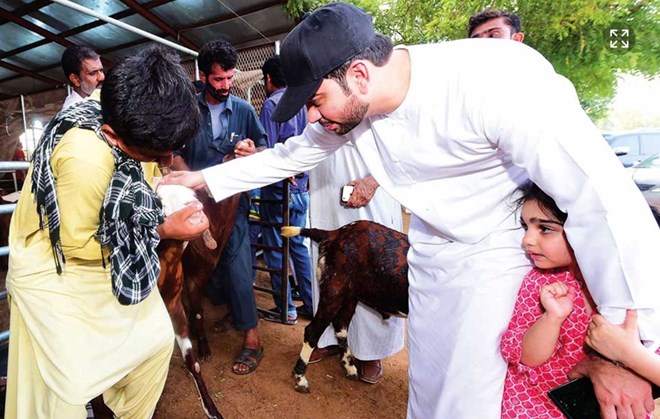
Sunday August 19, 2018
Prices of sacrificial animals were high at Dubai’s main cattle market on Friday, just days ahead of Eid Al Adha, which starts on Tuesday in the UAE.
Prices of goats, which most people prefer as a sacrifice for Eid Al Adha, ranged from roughly Dh15,00 per goat to Dh5,000 — around 65 per cent higher than last Eid Al Adha in August 2017.
On Friday evening, livestock sellers at the cattle market in Al Ghusais said prices were high partly because of a low import of Pakistani goats. They added that Indian goats, meanwhile, were mostly coming in by air, which is more expensive than sea transport.
Livestock prices are dictated by supply and demand, the animal’s weight, health, variety, the country from which they originate — and haggling skills.
Ghulam Akbar, a Pakistani livestock seller at the market, said: “So far, there are only around 500 Pakistani goats here. Pakistan is trying to meet its domestic demand and the goats exported from there are fewer than last year. This has pushed up prices.”
Akbar, whose goat shed is opposite Shabab Palestine Cafeteria, added: “If there were smaller, cheaper Somali goats — Dh400 or Dh500 per head — it would be a relief for customers. But Somali goats have not come in for a few years now.”
According to sellers, there are smaller goats for around Dh500 per head but they are not suitable for sacrifice because they are too young. Also cheaper are suitable Indian sheep, going for around Dh1,000 per head for a 10-12kg sheep. Bigger 35kg Syrian sheep were quoted at around Dh2,000.
“Last year, many livestock were coming by sea, but lately many are coming by air. We still have some days left before Eid and the situation could change — up or down.”
During last year’s Eid Al Adha, Dubai markets received 170,000 animals. This number was expected to increase by 60 per cent this year to 300,000, officials had said a week ago.
In peak summer, livestock are not usually transported by sea due to the long journey and the chances of them falling sick or dying on the way, sellers said.
In coordination with the Ministry of Climate Change and Environment, all animals are subjected to quarantine procedures as well as physical inspections and laboratory tests, to ensure they are safe and free from infectious, communicable and common diseases.
On Friday, livestock shopper Mohammad Rafi, from India, said the prices were too high. “An Indian goat weighing around 25kg is going for almost Dh3,000 — the rate was around Dh1,500 last Eid Al Adha. I want to buy four goats but Dh10,000 or Dh12,000 is too much.”
Muslims in the UAE and other countries sacrifice livestock — a goat or sheep generally, sometimes a cow — to celebrate Eid Al Adha, which is known as the festival of sacrifice. The ritual means cattle markets and abattoirs are full of customers a day or two before Eid, with the rush peaking on the first day of Eid. The festival also marks the conclusion of the annual Haj pilgrimage.
Meanwhile, prices of cows are around the same as last year, sellers and customers said. Cows that are two to three years old cost between Dh7,500 and Dh9,000, approximately. Almost all cows there are from Pakistan, according to Mohammad Qamarudin, a cow seller.
In Islamic tradition, up to seven people can share in the sacrifice of a cow, dividing up the price and meat.
Mohammad Zahir, a Pakistani expat shopping for a cow, said: “The prices are almost the same as last year. You can share in the sacrifice of a cow so the cost to one person can be comparatively lower than buying a large goat on your own.”
Prices also tend to fall on the second and third day of Eid Al Adha, when demand is lower. Most people rush to buy and sacrifice an animal on the first Eid day itself, even though they can do it on the second and third day.
The first day rush keeps abattoirs very busy — some people opt for illegal quick-service by “roaming butchers” who slaughter the animals in unauthorised areas. Last Wednesday, authorities in Al Ain cautioned residents to hire professional butchers for slaughtering their cattle for Eid, or face a hefty Dh10,000 fine.
What is Eid Al Adha?
Eid Al Adha is a festival in Islam known as the festival of sacrifice. It falls on the 10th day of the Islamic month of Dhu Al Hijja, the month named after the annual Haj to Makkah, Saudi Arabia.
Muslims believe Prophet Abraham was commanded by God to sacrifice his son Esmail. When Abraham was about to carry out the command, God accepted his spirit of obedience and a goat was sacrificed instead. To honour Prophet Abraham’s response, Muslims sacrifice a goat, sheep, cow or camel for Eid Al Adha, which lasts till the 13th of Dhu Al Hijja.
It is recommended to cook part of the sacrificial meat for the family, gift a part to relatives and needy and give a part in charity. The days of Eid Al Adha are an occasion to enjoy food and drink, wear new clothes, visit each other, give gifts to children and perform acts of worship.
